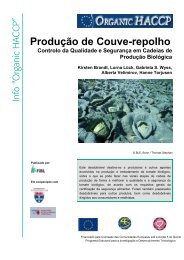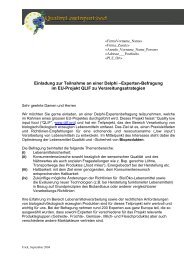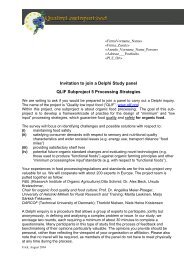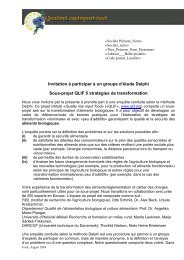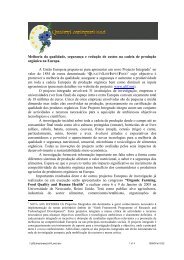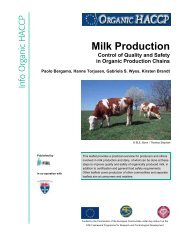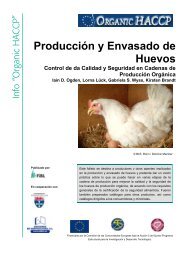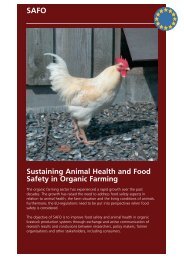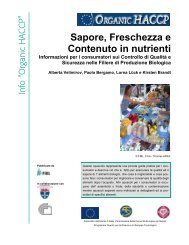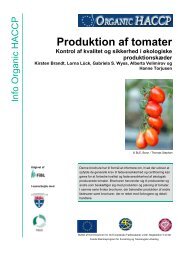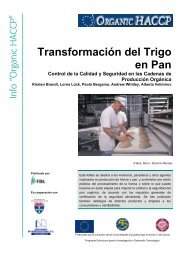ORGANIC SEED PROPAGATION: CURRENT STATUS AND ...
ORGANIC SEED PROPAGATION: CURRENT STATUS AND ...
ORGANIC SEED PROPAGATION: CURRENT STATUS AND ...
You also want an ePaper? Increase the reach of your titles
YUMPU automatically turns print PDFs into web optimized ePapers that Google loves.
ENVIRFOOD<br />
FP6-2003-SSA-1-007003<br />
Deliverable 4<br />
reasons, based on agronomic or economic evidence. Request must be submitted in<br />
writing.<br />
General derogation – no variety adapted for professional use. From organicXseeds<br />
downloaded confirmation is sufficient, no request in writing is demanded.<br />
Nearly all of arable crops are on the step one or two, which means that farmers need<br />
derogation for the use of non-organic seeds. The following four commissions of the labelorganisation<br />
BIO SUISSE are doing classification: arable and fodder crops, vegetables,<br />
ornamentals, herbs and spices. These commissions are composed of advisors, researchers and<br />
mainly of organic farmers. This is a certain guarantee that the classification is well accepted<br />
by farmers.<br />
Special regulations have been set up for mixtures of grass seeds. Since not all desired<br />
components of grass and clover are available in organic quality, it is asked for a minimal<br />
amount of organic seeds of 30 % on mixtures. These 30 % organic seeds may be used without<br />
any derogation. Mixtures with less than 30 % (next year 40 %) organic components need<br />
derogation.<br />
With vegetables Switzerland has more problems, because there the quality standards<br />
of the whole trade are very tough and some breeders who dominate certain species are not<br />
willing to produce organic seeds or giving licences to organic seed producers.<br />
All organic farmers’ addresses are registered on organicXseeds. All farmers have access to<br />
the derogation tools with a personal password. In Switzerland the derogations are handled by<br />
FIBL Institute. In the other organicXseed-countries (U.K., Germany, Luxemburg, Belgium),<br />
the private control bodies are responsible to give derogations.<br />
Andreas Thommen from FIBL is of the opinion that the Swiss solution has the advantage:<br />
FiBL as an independent institute has to decide about calls for derogations. To let the control<br />
bodies decide means, private bodies, which are in concurrence with one another, may give<br />
derogations to their own customers, from which they depend. This may lead to too much<br />
allowed derogations. Andreas Thommen would strongly recommend the Swiss solution,<br />
which is much more fair and just. (Source: Andreas Thommen, FIBL,<br />
andreas.thommen@fibl.org).<br />
In Sweden for all crops that are not mentioned in Annex 1 there is a general<br />
derogation e.g. for flax, sugar beet and buckwheat. The farmers have to apply for derogations<br />
to the Swedish Board of Agriculture. If there is missing an essential variety of a crop (e.g. for<br />
a region, for market purpose, for resistance to diseases) or the farmer wants to test a new<br />
variety in a small scale field trial the Board is authorizing derogations (when possible a<br />
general and otherwise individuals). (Source: Gunilla Idestrom, information@sjv.se)<br />
Juha Kieksi (juha.kieksi@mmm.fi) told that in Finland farmers have to apply for<br />
derogation to local governmental organization according to Regulation 1452/2003.<br />
In Norway farmers are allowed to use non-organic seed if they can’t get the variety<br />
they need. This seed has to be non-treated (but cedomon treatment is allowed) and the farmers<br />
must get a statement from the seed merchants that they are not able to deliver organic seed of<br />
this variety. This system applies to all the crops. This system is found to be the most suitable<br />
as long as the organic sector is quite small and due to the latter the supply of organic seed<br />
from different varieties is rather limited. (Source: Chris Dybvad, Debio:<br />
chris.dybvad@debio.no)<br />
Denmark has adopted a stringent derogation system and therefore considers a<br />
national annex unnecessary. For example, since Denmark is self-sufficient in cereals, farmers<br />
will never get derogations for these crops. Also for grass seeds and potatoes Denmark has ‘in<br />
fact’ a national annex. The Danish Plant Directory issues derogations, and this institution has<br />
made an annual report on the derogations issued in Denmark in 2004:<br />
13




